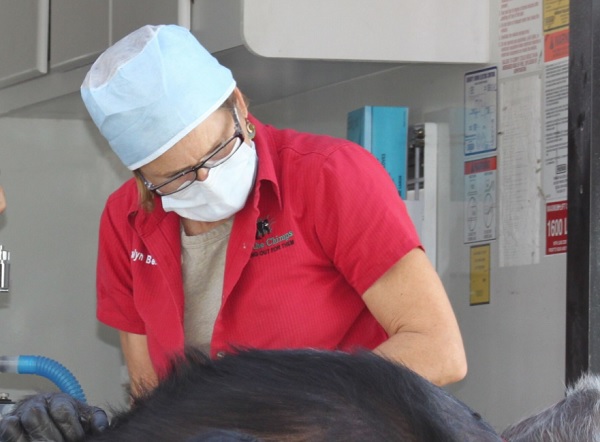Save the Chimps, the largest sanctuary in the world, working to unravel the mystery of heart disease in male chimpanzees
Cardiovascular disease, a major and often silent killer in humans is also a major threat to captive male chimpanzees. Both humans and chimpanzees have a very similar genetic make-up and sadly, heart disease is something both chimps and humans also share. For male chimps, whether living in sanctuaries, like Save the Chimps, or in zoos, many of the males seem to have a high incidence of heart disease, the kind that can kill without warning. As Dr. Jocelyn Bezner, chief veterinarian for Save the Chimps, says, “they can be eating a banana or happily sitting outside in the sun one minute, and sadly, collapse in the next moment. Our job however and our goal, is to find out why and to do everything we can to prevent this.” This is why, according to Dr. Bezner, Save the Chimps, on a regular basis, tests its chimps for cardiovascular disease using echocardiograms and this coming week, that’s what the Sanctuary will be doing again.
Although the cause is still unknown, Save the Chimps is involved in a large, collaborative study with other wildlife organizations, called the Great Ape Heart Project or GAHP, to better understand the disease. Working collaboratively with zoos, sanctuaries and some of the leading primate heart specialists in the world, Save the Chimps this Monday and Tuesday, will conduct echocardiograms on a number of its retired resident chimpanzees at the sanctuary to test them for heart disease. If evidence of heart disease is noted, the chimps may be given drugs similar to what is given to humans including diuretics, beta blockers, and ace inhibitors. The chimps are fully sedated before receiving echocardiograms, and the entire process is coordinated and closely monitored by the specially trained veterinarians at the Sanctuary.
“What is especially interesting with the chimps,” says Dr. Bezner “is that the type of heart disease the chimpanzees exhibit is slightly different than what we see more often in humans. The pathological change that occurs in chimps is such that the healthy heart muscle gets replaced by scar tissue.”
This week, an expert from the Great Ape Heart Project based in Atlanta, Georgia, Bobbie Boyd, a specialist in ultrasonography, will be on site at the Save the Chimps sanctuary in Fort Pierce, Florida. Joining Boyd will be Dr. Woody Hayes, a Florida-based veterinary imaging specialist, who has been assisting Save the Chimps for eight years. Together with Save the Chimps’ own highly trained veterinary team, they will be screening the chimps for heart disease. It is hoped that as more is learned about why male chimps are prone to heart disease, new modalities will emerge that could both extend and improve their lives and we will begin to find critical answers to the cause of cardiovascular disease. By treating the chimpanzees earlier based upon findings, we can also extend their lives and help others in the future.
Donate today in support of veterinary care of the chimpanzees »


